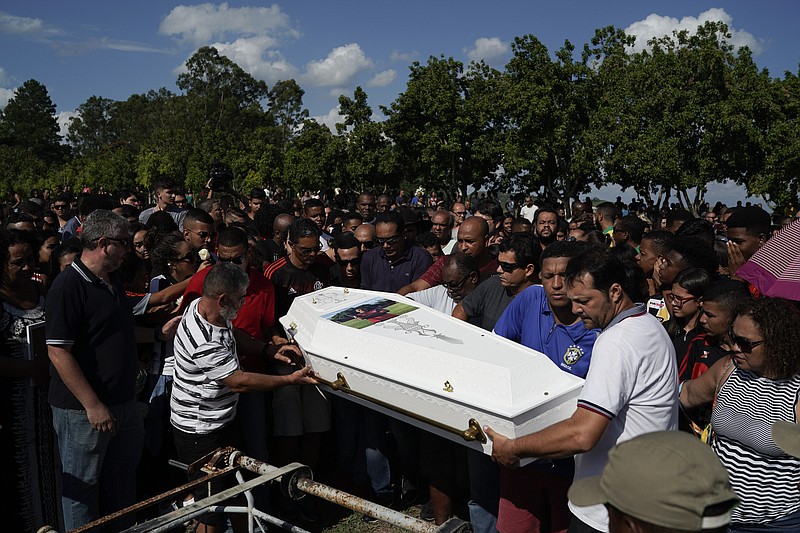RIO DE JANEIRO (AP) — Under mounting criticism Saturday, Brazilian soccer club Flamengo defended its management of the training ground where a fire killed 10 of its academy players — all between 14-16 years old — at a dormitory that had been registered with the city as a parking lot.
Rio de Janeiro’s city hall said in a statement Flamengo was fined 31 times because of infractions at the Ninho do Urubu training ground, which had to be closed in October 2017. The club did not pay 21 of those fines.
The current permit issued for the grounds is valid until March 8.
Earlier, city hall also said the sleeping quarters where Flamengo’s players died was irregularly licensed as a parking lot.
“The lodging area hit by the fire is not included in the last project approved by our licensing,” it said. “There are no registers of new licensing requests for that area as a sleeping quarter.”
Three teenagers injured in the fire are still in the hospital, including one in serious condition. The incident came just two weeks after a dam collapse in Brazil unleashed a flood of mining waste in Minas Gerais state that killed at least 134 people and left hundreds of others missing. On Thursday, torrential downpours and strong winds also killed at least five people and left a trail of destruction, stirring a wave of controversy over shoddy infrastructure and lax oversight in Latin America’s largest nation.
A former Flamengo player who spent 10 years with the institution was critical of its handling of young players. He asked to remain anonymous because he still played in a professional capacity.
“All of the young people in my generation see ourselves reflected in this tragedy,” he said. “If law officials investigate, more irregularities will come to light. It’s a situation that not only occurs in Flamengo but in all Brazilian football.”
Flamengo’s CEO Reinaldo Belotti pushed back on accusations, saying the licensing issues “have nothing to do with the accident.” He said the sleeping quarter was a proper lodging and not an improvised structure.
“We have to take measures to legalize our training ground,” Belotti said. “We needed nine certificates and we already have eight. We are working with the fire department.”
Belotti linked the heavy Rio rains earlier in the week to what he called “a tragic accident” and said unstable electricity could have sparked the fire.
“It was not because of lack of attention and care from Flamengo. These boys are our biggest asset,” he said. “It was all a succession of events after a catastrophic day for Rio.”
The executive did not take questions and did not explain why the sleeping quarter was registered as a parking lot in the project originally sent to Rio’s city hall.
The cause of the fire is still unknown, although authorities are looking at a possible short circuit in the air conditioning system. The administration of Mayor Marcelo Crivella said it would open an investigation, while local police said they have already heard testimony from 13 surviving players and three Flamengo staffers.
Forensic experts identified seven of them: Arthur Vinicius de Barros Silva, Pablo Henrique da Silva Matos, Vitor Isaias Coelho da Silva, Bernardo Augusto Manzke Pisetta, Gedson Corgosinho Beltrao dos Santos, Athila de Souza Paixao and Christian Esmerio Candido, a 15-year-old goalkeeper that had already played for Brazil’s national team’s youth divisions.

